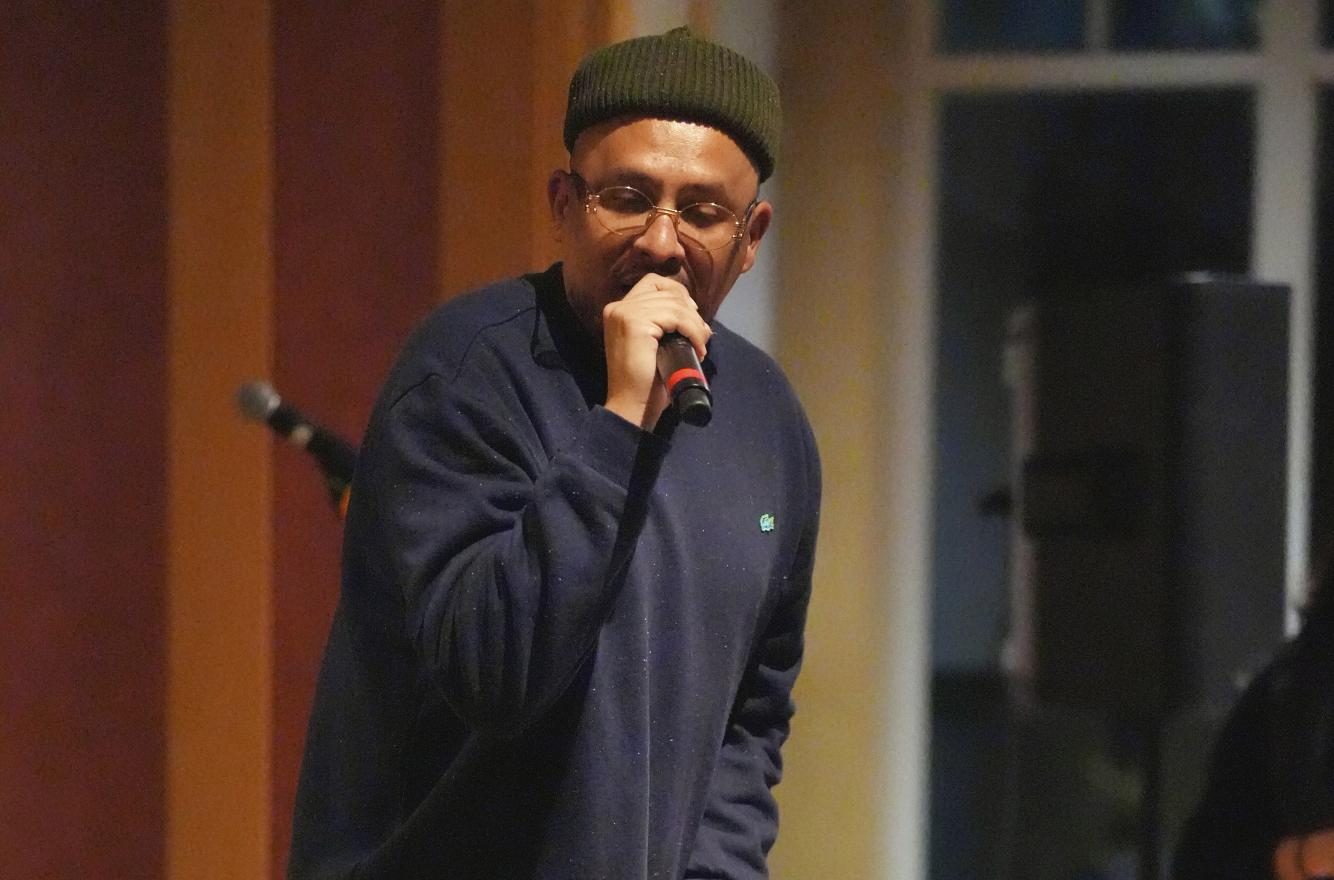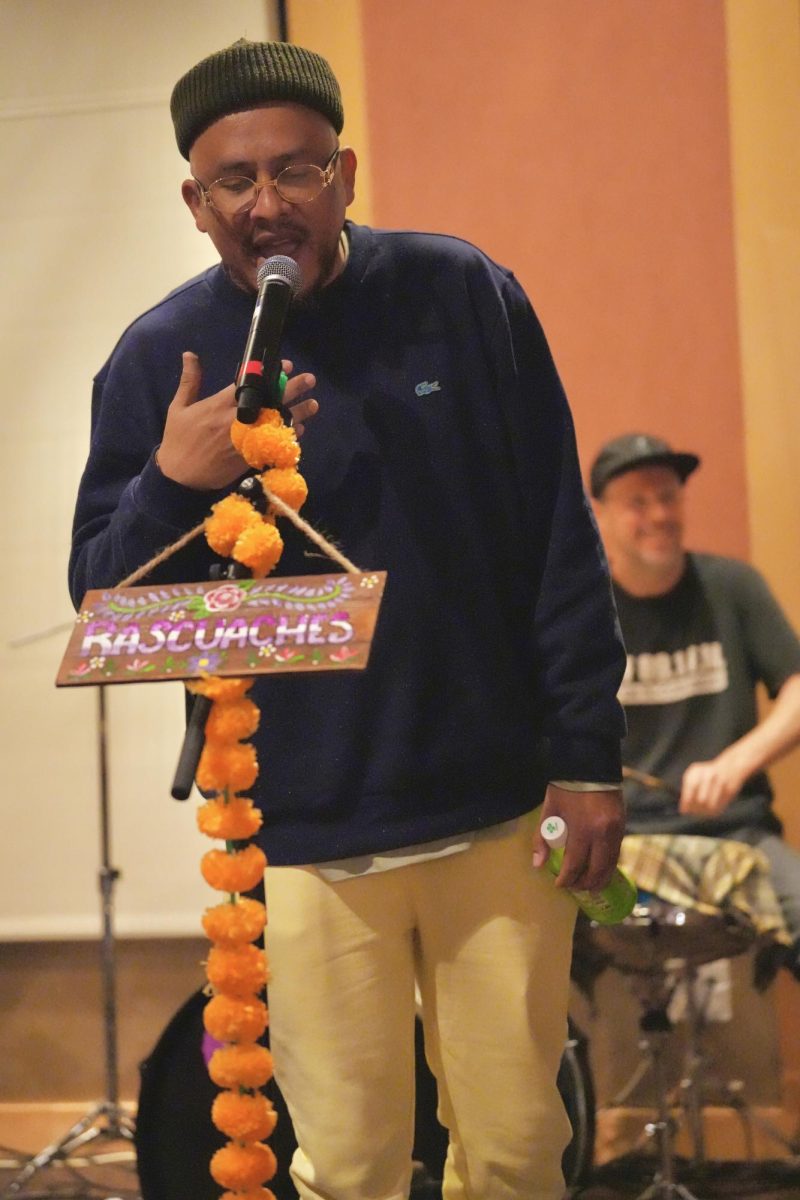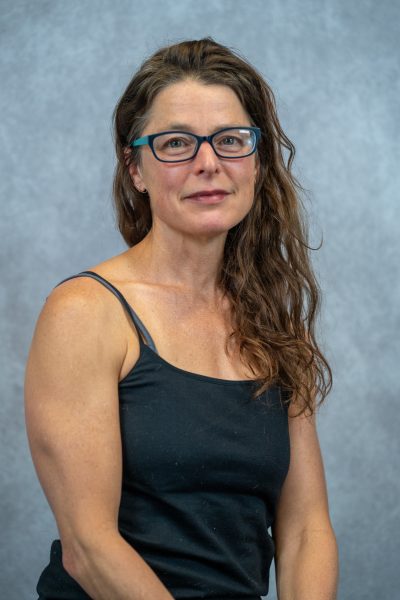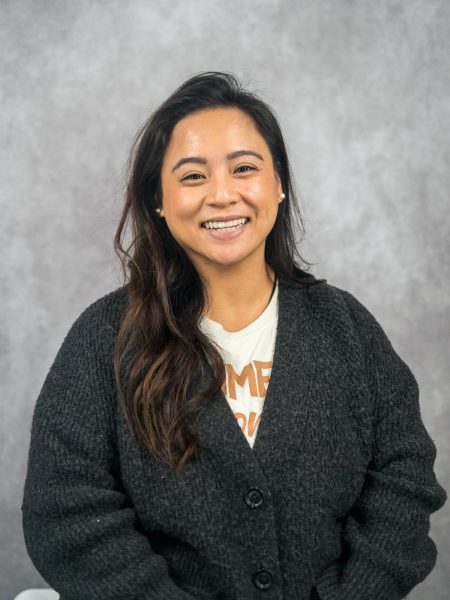Spoken word artist Bocafloja, whose work centers around social and political critique, electrified Santa Rosa Junior College students, faculty and community members at his concert Friday evening at Bertolini Student Center.
In February 2023, the Movimiento Estudiantil Chicanista de Aztlán (MEChA) club invited Bocafloja to give the keynote address at their Youth Conference, which brought over 900 middle and high school students to SRJC. This year, Bocafloja returned to lead a spoken word workshop and give a concert for students, faculty and community members.
Bocafloja wore a plain, navy Lacoste sweatshirt, butter-yellow sweatpants and an olive beanie and worked his mixes on a small, well-traveled laptop. His hexagonal gold-framed glasses and multicolored-striped high-tops were subtle nods to his eclectic and unassuming style.
But as soon as the backbeat started, a supercharged Bocafloja inflamed the audience with his spoken word poetry. He strode across the small stage and unleashed the coiled intensity of his songs, which drew on personal experience and critical race theory. Throughout his performance, energy flowed between performer and audience as Bocafloja interrupted himself frequently mid-song to call out to the crowd.
“Como se siente, Santa Rosa? Put your hands in the air!” he said.
The responsive audience threw their hands in the air and cheered. “Come a step closer,” Bocafloja said repeatedly. “I want to feel your energy!” And everyone took a step closer until, by the last song, the audience nearly embraced the singer.
Before the concert, Bocafloja led a spoken-word workshop for students.
Calm, soft-spoken, Bocafloja gazed with compassion at the assembled students, a couple dozen, seated at the tables and sofas of the Intercultural Center in Pioneer Hall.
“Tell me about your universe,” he said. “Why are you here?” Each student brought different reasons. One student writes poetry, another has never experienced a writers’ workshop.
“I’m from the first generation of Mexican hip-hop,” Bocafloja told the students. His poetry addresses institutionalized racism and mental slavery, as well as social and political oppression. He encouraged students to draw on their lived experiences to write their own poetry.
His aim Friday afternoon was to share the process behind the scenes: the process of writing. He contrasted this to that of many artists, whose main motivation when getting into an artistic process is to “satisfy themselves,” Bocafloja said.
In contrast, Bocafloja pointed to the artist’s role and responsibility to the community. “I believe that every time you’re creating a cultural product, it becomes an experience that is embraced, translated into other people’s reactions that demands a certain level of responsibility because we impact them,” he said.
The “process of being critical, of being engaged [is essential,] especially when fighting against a machinery that is meant to oppress,” he said, referring to mechanisms of governmental, political, economic and social control.
“Do you believe that art has a possibility to be useful in terms of social transformation?” Bocafloja asked the students. He described the many “revolutions of social transformation that walk[ed] alongside artistic production,” such as the Cuban revolution where music was a bridge, or the Black Panthers. “Arts and culture, film and music, theater—[are] crucial and fundamental to these processes,” he said. “Artistically, we can create a language and platform that can be navigated.” He asked if any of the students write, or sing or create. “I write poetry,” one student said. One student said she crochets and creates with fibers.
Bocafloja picked up the thread and spoke about how “abuelas who didn’t have access to paper and pen,” used crocheting as a way to create.
“I believe that in my case — and a lot of other poets — poetic language is a way to be more effective,” he said. But, most importantly, it must be “wise enough, strategic enough. So use the best word possible to express a bigger concept,” he told students.
While he chooses poetry today, he did not come naturally to classic poetry, which he found “very formal” and “very sterile.” It was “not communicating to my own personal existence,” he said. So he needed to “find the poetic realm in a way that is useful.”
This personal “why” imbues his spoken-word poetry and performance. In the workshop, he asked students, “What’s going on in your community? What’s going on in your world?”
Students responded with personal stories of social and racial injustice. Workshop attendee Omé Zúñiga spoke about others outside of their community who are “not all that educated in what is going on in the world. They’re ignorant.” Outsiders, indifferent or ignorant to social realities, “live freely because they’re uneducated. For them, ‘ignorance is bliss,’” he said.
This comment sparked Bocafloja’s creative juices. “It would be cool if we could create together a little piece,” he said. He solicited students to offer more lines or words to “put on paper” as starting points for their own poems.
One student described how those in positions of power manipulate resources. “They’re trying to make it feel like it’s your fault when they get rid of resources.”
Another student described living in a mostly white community in Colorado where she was “praised” for not having an accent. Years later, after she moved out of that community, she reclaimed her accented Latinax identity. “What they consider is an accent is what makes us special,” said workshopper Adriana Hernandez.
Bocafloja added “accent” to the poetry wall and “patience is a virtue,” that another student offered. Then, for a quiet 10 minutes, students bent their heads over their notebooks and wrote.
Plurality of voices and collaboration are central to Bocafloja’s artistic process. His music blends many traditions and cultures, and he looks to the past to examine history. But he never neglects the here and now, most especially while he performs his spoken word.
At the beginning of his concert, Bocafloja greeted the three or four dozen students, faculty, and community members who had come to enjoy his performance. “Buenas noches, familia,” he said. The eclectically-dressed audience danced non-stop, drawing closer and closer to Bocafloja’s energy. “Cómo se siente, mi familia?” he asked repeatedly.
“Inspired,” “excited,” “super-connected” answered the individual audience members when an Oak Leaf reporter asked how they felt after the concert. Others found the show “inspirational,” and summed it up their feelings with single words such as “awesome,” “community,” “collective care,” and “conocimiento,” which means “wisdom.” “It’s beautiful to see how things blend together,” said student Dyonna Johnson, speaking for many in the exuberant crowd.







